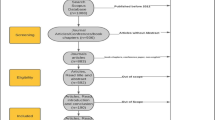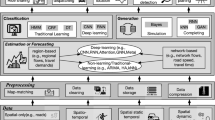Abstract
Electric buses (EBs) are gaining popularity worldwide as a more sustainable and eco-friendly alternative to diesel buses (DBs). Electricity-saving driving plays a crucial role in minimizing an EB’s energy consumption, subsequently leading to an extended driving range. This study proposes a machine learning–based framework for identifying electricity-saving EB driving behaviors during various driving stages, including running on road segments, entering bus stops/intersections, and exiting bus stops/intersections. The proposed random forest (RF) model effectively evaluates the energy consumption level using EB drivers’ historical driving data under different scenarios. Specifically, the electricity consumption factor (ECF), as the evaluation index, is divided into three categories to determine the implicit relationship between driving behavior and energy consumption. The results indicate that the classification accuracy of RF models surpasses 90%, which highlights the effectiveness in accurately identifying energy-efficient EB driving behaviors. In addition, the Shapley additive explanations (SHAP) and partial dependency plots (PDPs) are utilized to visualize and interpret the results of RF models. A speed interval of 30–40 km/h is identified as the most energy-efficient range for EB running on a road segment. Findings from this study can be applied to targeted optimization of electricity-saving driving strategies in different driving scenarios to improve the overall efficiency and sustainability of the transportation system.













Similar content being viewed by others
Data availability
The datasets used during the current study are available from the corresponding author on reasonable request.
References
Ali S, Yan Q, Dilanchiev A, Irfan M, Fahad S (2023) Modeling the economic viability and performance of solar home systems: a roadmap towards clean energy for environmental sustainability. Environ Sci Pollut Res 30(11):30612–30631
Ali M, Irfan M, Ozturk I, Rauf A (2022) Modeling public acceptance of renewable energy deployment: a pathway towards green revolution. Econ Research-Ekonomska Istraživanja 1–19
Asif MH, Zhongfu T, Ahmad B, Irfan M, Razzaq A, Ameer W (2023a) Influencing factors of consumers’ buying intention of solar energy: a structural equation modeling approach. Environ Sci Pollut Res 30(11):30017–30032
Asif MH, Zhongfu T, Dilanchiev A, Irfan M, Eyvazov E, Ahmad B (2023b) Determining the influencing factors of consumers’ attitude toward renewable energy adoption in developing countries: a roadmap toward environmental sustainability and green energy technologies. Environ Sci Pollut Res 30(16):47861–47872
Asif MH, Zhongfu T, Irfan M, Işık C (2023c) Do environmental knowledge and green trust matter for purchase intention of eco-friendly home appliances? An application of extended theory of planned behavior. Environ Sci Pollut Res 30(13):37762–37774
Barkenbus JN (2010) Eco-driving: An overlooked climate change initiative. Energy Policy 38(2):762–769
Bengler K, Dietmayer K, Farber B, Maurer M, Winner H (2014) Three decades of driver assistance systems: review and future perspectives. IEEE Intell Transp Syst Mag 6:6–22
Chiara F, Wang J, Patil CB, Hsieh M-F, Yan F (2011) Development and experimental validation of a control-oriented diesel engine model for fuel consumption and brake torque predictions. Math Comput Model Dyn Syst 17(3):261–277
D'agostino C, Saidi A, Scouarnec G, Chen L (2014) Rational truck driving and its correlated driving features in extra-urban areas. In 2014 IEEE Intelligent Vehicles Symposium Proceedings (pp. 1199-1204). IEEE
De Cauwer C, Verbeke W, Coosemans T, Faid S, Van Mierlo J (2017) A data-driven method for energy consumption prediction and energy-efficient routing of electric vehicles in real-world conditions. Energies 10(5):18
Fetene GM, Kaplan S, Mabit SL, Jensen AF, Prato CG (2017) Harnessing big data for estimating the energy consumption and driving range of electric vehicles. Transp Res Part d: Transp Environ 54:1–11
Gilman E, Keskinarkaus A, Tamminen S, Pirttikangas S, Roning J, Riekki J (2015) Personalised assistance for fuel-efficient driving. Transp Res Part C-Emerg Technol 58:681–705
Huang Y, Zhu L, Sun R, Yi J, Liu L, Luan TH (2020) Save or waste: real data based energy-efficient driving. IEEE Access 8:133936–133950
Kivekäs K, VepsäläInen J, Tammi K (2018) Stochastic driving cycle synthesis for analyzing the energy consumption of a battery electric bus. IEEE Access 6:55586–55598
Liimatainen H (2011) Utilization of fuel consumption data in an ecodriving incentive system for heavy-duty vehicle drivers. IEEE Trans Intell Transp Syst 12(4):1087–1095
Luin B, Petelin S, Al-Mansour F (2019) Microsimulation of electric vehicle energy consumption. Energy 174:24–32
Lv C, Hu XS, Sangiovanni-Vincentelli A, Li YT, Martinez CM, Cao DP (2019) Driving-style-based codesign optimization of an automated electric vehicle: a cyber-physical system approach. IEEE Trans Industr Electron 66(4):2965–2975
Ma XL, Miao R, Wu XK, Liu XL (2021) Examining influential factors on the energy consumption of electric and diesel buses: a data-driven analysis of large-scale public transit network in Beijing. Energy 216:12
Pamula T, Pamula W (2020) Estimation of the energy consumption of battery electric buses for public transport networks using real-world data and deep learning. Energies 13(9):17
Poucin G, Farooq B, Patterson Z (2018) Activity patterns mining in Wi-Fi access point logs. Comput Environ Urban Syst 67:55–67
Reverdiau G, Le Duigou A, Alleau T, Aribart T, Dugast C, Priem T (2021) Will there be enough platinum for a large deployment of fuel cell electric vehicles? Int J Hydrogen Energy 46(79):39195–39207
Sun DJ, Zhang K, Shen S (2018) Analyzing spatiotemporal traffic line source emissions based on massive didi online car-hailing service data. Transp Res Part d: Transp Environ 62:699–714
Sun D, Wen H, Wang D, Xu J (2020) A random forest model of landslide susceptibility mapping based on hyperparameter optimization using Bayes algorithm. Geomorphology 362:107201
Sun DJ, Zheng Y, Duan R (2021) Energy consumption simulation and economic benefit analysis for urban electric commercial-vehicles. Transp Res Part d: Transp Environ 101:103083
Tong HY, Ng K (2021) Development of bus driving cycles using a cost effective data collection approach. Sustainable Cities and Society 69:102854
Vepsäläinen J, Kivekäs K, Otto K, Lajunen A, Tammi K (2018) Development and validation of energy demand uncertainty model for electric city buses. Transp Res Part d: Transp Environ 63:347–361
Xu JS, Saleh M, Hatzopoulou M (2020) A machine learning approach capturing the effects of driving behaviour and driver characteristics on trip-level emissions. Atmos Environ 224:14
Yang Y, Li T, Zhang T, Yu Q (2020) Time dimension analysis: Comparison of Nanjing local driving cycles in 2009 and 2017. Sustainable Cities and Society 53:101949
Yao Y, Zhao X, Du H, Zhang Y, Rong J (2018) Classification of distracted driving based on visual features and behavior data using a random forest method. Transp Res Rec 2672(45):210–221
Yu Q, Li T (2014) Evaluation of bus emissions generated near bus stops. Atmos Environ 85:195–203
Zhang Y, Yuan W, Fu R, Wang C (2019) Design of an energy-saving driving strategy for electric buses. IEEE Access 7:157693–157706
Zhang Y, Yuan W, Fu R, Wang C (2021) Design and simulation of energy saving driving strategy for pure electric bus entering and leaving stops. J Transp Syst Eng Inf Technol 21(4):106–117
Zhang Y, Fu R, Guo Y, Yuan W (2022) Environmental screening model of driving behavior for an electric bus entering and leaving stops. Transp Res Part d: Transp Environ 112:103464
Zhang J, Wang Z, Liu P, Zhang Z (2020) Energy consumption analysis and prediction of electric vehicles based on real-world driving data. Appl Energy 275:115408
Zhao XH, Wu YP, Rong J, Zhang YL (2015) Development of a driving simulator based eco-driving support system. Transp Res Part C-Emerg Technol 58:631–641
Zhou B, Wu Y, Zhou B, Wang R, Ke W, Zhang S, Hao J (2016a) Real-world performance of battery electric buses and their life-cycle benefits with respect to energy consumption and carbon dioxide emissions. Energy 96:603–613
Zhou M, Jin H, Wang WS (2016b) A review of vehicle fuel consumption models to evaluate eco-driving and eco-routing. Transp Res Part D-Transp Environ 49:203–218
Funding
The research in this paper was jointly supported by the National Key Research and Development Program of China (No. 2021YFE0112700), the Postgraduates Research and Innovation Program in Jiangsu Province (No. 36 KYCX21_0128), the National Natural Science Foundation of China (No. 41877395), and the EU-funded project MODALES (grant agreement No. 815189).
Author information
Authors and Affiliations
Contributions
Sirui Nan: conceptualization, methodology, validation, formal analysis, investigation, writing—original draft, and visualization. Feixiong Liao: conceptualization, methodology, writing—review and editing, and supervision. Tiezhu Li: conceptualization, data curation, writing—review and editing, and supervision. Haibo Chen: data curation. Jian Sun: writing—review and editing.
Corresponding author
Ethics declarations
Ethical approval
Not applicable.
Consent to participate
Not applicable.
Consent for publication
Not applicable.
Competing interest
The authors declare no competing interests.
Additional information
Responsible Editor: Philippe Garrigues
Publisher's note
Springer Nature remains neutral with regard to jurisdictional claims in published maps and institutional affiliations.
Rights and permissions
Springer Nature or its licensor (e.g. a society or other partner) holds exclusive rights to this article under a publishing agreement with the author(s) or other rightsholder(s); author self-archiving of the accepted manuscript version of this article is solely governed by the terms of such publishing agreement and applicable law.
About this article
Cite this article
Nan, S., Liao, F., Li, T. et al. Identifying the electricity-saving driving behaviors of electric bus based on trip-level electricity consumption: a machine learning approach. Environ Sci Pollut Res 30, 82743–82759 (2023). https://doi.org/10.1007/s11356-023-28107-6
Received:
Accepted:
Published:
Issue Date:
DOI: https://doi.org/10.1007/s11356-023-28107-6




